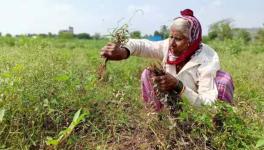Carry out Further Investigation into Private Distribution of Remdevisir; Prepare Adequately for a Third Wave: Bombay High Court
Avacation bench of the Bombay High Court comprising Justices AA Sayed and GS Kulkarni Thursday continued to hear the state of Maharashtra and Centre’s submissions about the level of preparedness to combat the spread of black fungus in the state.
The bench asked the state to submit information about the feasibility of building oxygen generating machines in private hospitals, and the creation of centralised information dashboard for COVID-19 related information. It also called for further investigation into the instances of private actors supplying medication to patients.
Advocate General Ashutosh Kumbhakoni appeared for the state of Maharashtra and ASG Anil Singh appeared for the Central government.
The AG informed the court that every patient of black fungus, on average, requires 4 to 5 vials per day, depending on the clinical condition and needs to be treated for a period 21 days to 28 days. With 3200 active patients, the state roughly requires 14,000 vials per day.
There are currently 7 manufacturers in the country who are eligible to produce the drug – Amphotericin B. Like Remedevisir, the Centre has taken over allocation of this drug among all states.
Presently, Maharashtra has been allocated 4,000 – 5,000 vials per day, on average. This is an average estimate because the state was sent 7,000 vials on one day and none on another day.
The Court enquired about whether the 40,000 vials were being produced within the state of Maharashtra.
The AG submitted that they were, and would then be supplied to the Centre, who would distribute them. He also mentioned that additional manufacturers will be ready to manufacture the drug by 6th June 2021.
The Court then clarified that 40,000 was, in that case, not an accurate projection for Maharashtra, but for the country.
The AG clarified that the present condition is expected to improve as more manufacturers are able to produce the drug. He also informed the Court that the state was also placing import orders for the drug in question.
He also reiterated that the Maharashtra government had identified and empanelled 131 hospitals in the state under the Jyotiba Phule Jan Arogya Yojna, where residents of the state will be able to avail treatment for black fungus disease. He mentioned that this empanelment had taken place through a government resolution that had been issued on 18th May 2021.
Upon the Court’s inquiry, the AG also submitted that the majority of black fungus are currently found in the rural areas of Maharashtra but he has been informed that the disease has less to do with region and more to do with immunity. While most of the cases are those of patients that have recovered from COVID-19 and find their immunity to be lower than regular, it has also affected patients who have no history of COVID-19. Keeping with the risk to immunocompromised patients, the AG also mentioned that those who suffer from severe diabetes are at risk of contracting black fungus.
The AG submitted that he had been informed that three manufacturers all over the country were in the production process: Bharat Serum, Mylan and Cipla.
He reiterated that the lack of vials to treat black fungus were concerning, highlighting that a state like Maharashtra, that required 40,000 vials on a daily basis was receiving a mere 4,000 vials per day. He informed the Court that the delay largely stems from the 20 day production process for the required drug.
The Court asked ASG Anil Singh to take instructions about identifying foreign manufacturers and allowing state governments to place orders for the drug as soon as possible.
The ASG clarified that from 11th May 2021 to 26th May 2021, the total allocation of the drug to the state of Maharashtra had been allotted 42,690 vials of the drug.
The AG stated that he would file responses, if any, in an affidavit before the next hearing.
The Court then asked about the situation regarding Remdesivir in the state.
The AG submitted that the crisis was also “almost complete.” He stated that as per emails sent to the state by manufacturers such as Hetro, there was now enough stock of the drug, and a reduced number of takers. They had also asked for permission to begin distributing the drug through regular channels now, as supply was currently controlled by the Central government.
The Court also sought to find out whether the situation had improved across the state, or just in Mumbai, and the former was confirmed by the AG. He mentioned that roughly 10,000 vials of Remdevisir were available in the state, and the price was being controlled by the Centre. As the last piece of information on the matter, the AG stated that the state had expressed interest in importing the drug, and was waiting for approval from the Centre.
The Court then moved on to the matter of private players such as Sood Charity Foundation and Zeeshan Siddique distributing COVID-19 drugs to patients. The AG submitted that both had been served with notices, and had informed the state that they had not distributed any medicines or related drugs, but had only played the role of facilitators, putting people in need with those who could provide the adequate medication. They also provided the state with the names of entities to whom they paid the costs of drugs, to be supplied to those in need.
When the Court inquired as to how they were able to procure these drugs given that all supply was being controlled by the Central government, the AG clarified that he was only answering on the basis of their responses to the state, and had no additional information at the moment. He also clarified that the Maharashtra government had not formally accepted the responses, and had issued notices to manufacturers, in an attempt to get to the root of the matter.
The possibility that manufacturers such as Hetro and Cipla have subcontractors that could be supplying drugs outside the Central government’s scheme was also brought up by the AG.
The Court was also informed that the demand for oxygen and the number of patients had reduced in the state, and that the supply of oxygen from the Centre was sufficient at the moment. At this point, the ASG also mentioned that the national task force that had been set up to address the oxygen supply across states was working on the matter as well.
The Court then wished to know about the instructions that the AG had taken regarding oxygen generation in the state. Given the pressure swing adsorption plan, the AG informed the Court that the capacity to generate oxygen roughly translated into a project that cost 1 crore, and would be able to produce 1 metric ton of oxygen per day; companies are reportedly taking upto 10 to 12 weeks to build one such facility at the moment.
The Court asked the AG to look into the feasibility of such facilities, but also generally prepare for a possible third wave, regardless of whether and when it did take place. It emphasised that it was important to learn from the mistakes of the first and second waves
The Court also stated that it would be better for the state to issue instructions through an ordinance or an executive order about such facilities and others that could help with oxygen production instead of calling for amendments to the Maharashtra Nursing Homes Act.
Also Read: Aurangabad Bench of Bombay HC issues directions to curb spread of Covid-19 in suo-moto proceedings
The Court then moved on to the issue of creating a state-wide dashboard for real time COVID-19 updates.
The AG submitted that 3000+ hospitals were being linked to the dashboard, which was being created by merging 25 existing dashboards. The state is also taking the recommendations of doctors such as Dr. Jayant R. Navrange into consideration, and integrating their suggestions as far as possible.
The Court mentioned that updates about available medication, beds and oxygen should also be a part of the dashboard. It also insisted that this dashboard should also reflect data about those hospitals that do not update information on time, in order to ensure accountability.
The AG stated that while these aspects would be included, the state had also accounted for the training of operators to work on the dashboards across hospitals and regions.
The Court then asked the AG to submit information about the situation concerning hospitals, oxygen supply and medication in rural areas, to which the latter replied that he would submit an affidavit at the next hearing. It also acknowledged the suggestion from counsel of one of the petitioners that a grievance redressal mechanism should be built by the state to facilitate ease of registering and resolving complaints.
The Court moved on to the matter of crematoriums and sought to find out whether there were enough crematoriums available as per the number of deaths taking place on a daily basis. It stated that the goal was to ensure that those who have passed due to the pandemic receive a respectful cremation or burial, as the case may be. It also mentioned that taking cognisance of the matter mentioned in one of the petitions, it would advise the state to install electric and gas crematoriums as far as possible, given that the traditional methods of cremation would create large amounts of air pollution.
The Court then brought up the matter of fire audits, given that several fires had started owing to problems with air conditioning units, which could only be installed with verification of compliance with all safety norms. Given that hospitals had a large number of such units but also housed bed-ridden patients, it would be critical to address the issue at the earliest.
In response to the Court’s inquiry about giving laboratories additional permissions to test materials, the AG stated that this would have to be done with utmost care and hence was taking time, as there had been unconfirmed news that the virus which caused the COVID-19 pandemic had also escaped from a laboratory in Wuhan.
The AG then confirmed the setting up of the pediatric task force to address patients below the age of 18. He also mentioned that doctors at the grassroots level were also being educated and trained in related matters.
The Court then asked about data regarding deaths of habitual smokers, to which the AG responded that the mention of this matter at the previous hearing had resulted in excessive communication from cigarette manufacturers and tobacco companies, stating that their products did not have adverse effects for COVID-19.
Before concluding, the AG also stated that petitioners should approach his office with constructive suggestions before bringing them directly before Court, as they were open to the same, and this would save valuable time of the Court.
ASG Anil Singh started by placing on record the fact that the states and Centre were working on issues in a cohesive manner, and that the AG had very fairly stated that the state of Maharashtra had no present grievance with the Centre.
42,690 vials of the relevant drug had been allocated to Maharashtra between 11th May and 26th May. The total production in the country had been around 80,000 vials, of which a majority had been given to the most affected states of Maharashtra, Gujarat and Karnataka. Supply of the drug is also expected to increase to 3,52,000 in the month of June.
Here, the Court intervened to confirm that it would need per day production to make a fair assessment, as this increased number would not be useful if it was delivered only by the end of June.
The ASG submitted that he would mention these statistics at the next hearing.
He also mentioned that the Centre has issued an advisory about disease, highlighting diabetes and increased steroid use as two major causes for contracting it. The Centre had also issued a circular dated 17th May 2021, inviting applications for the manufacture of this drug used to treat black fungus.
To this, the Court responded that it would be prudent to look into the use of steroids to treat COVID-19, given that black fungus was a possible threat to patients.
It was also submitted the Centre, like some states, is also taking proactive steps to educate doctors about the treatment of COVID-19 and its mutations, as well as black fungus.
Bringing up the issue of black marketing, the ASG assured the Court that the Centre would be writing to manufacturers, and about prohibiting the supply directly to private persons, politician and celebrities.
Noticing the dual-action being taken by the state government and the Centre, the Court sought to clarify matters.
The ASG stated that the investigation would still be conducted by the state government, and that the Centre’s primary concern was, in fact, spurious drugs. Given the contradictory information about the source of supply other than the centrally controlled one, the Court asked the state to carry on with its investigation.
The Court stated that while the intentions of such private parties might be bona fide, distribution could not take place outside the legally mandated channels.
Lastly, the ASG stated that the Ministry of Health and Family Welfare had also issued instructions about creating dashboards across states for transparency of information.
The article was originally published in The Leaflet.
Get the latest reports & analysis with people's perspective on Protests, movements & deep analytical videos, discussions of the current affairs in your Telegram app. Subscribe to NewsClick's Telegram channel & get Real-Time updates on stories, as they get published on our website.
























